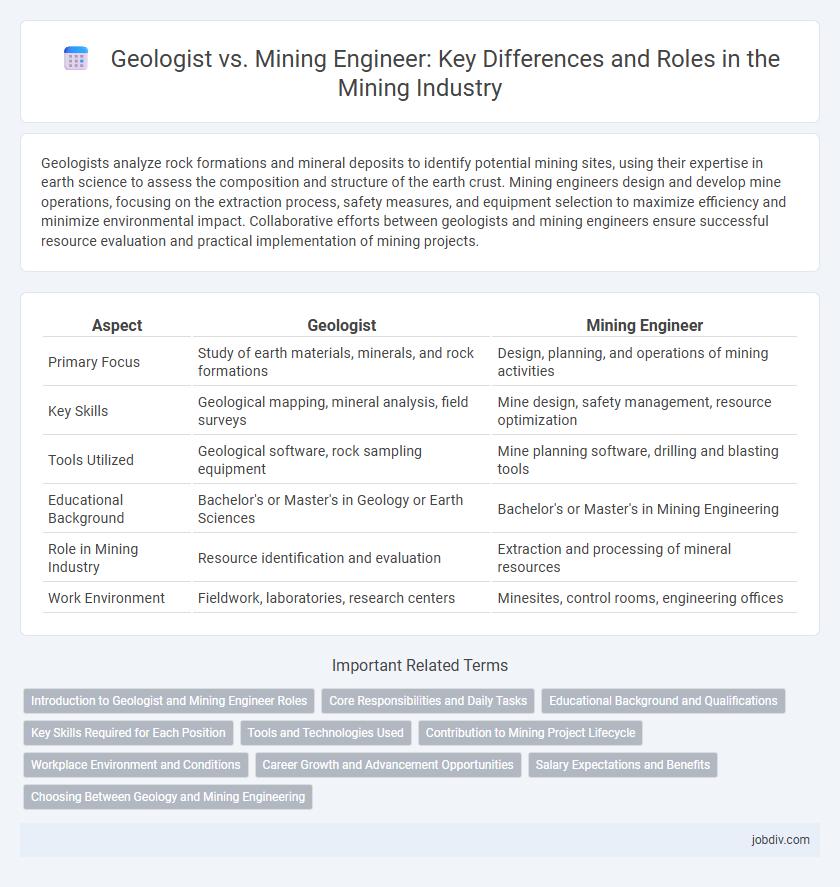Geologists analyze rock formations and mineral deposits to identify potential mining sites, using their expertise in earth science to assess the composition and structure of the earth crust. Mining engineers design and develop mine operations, focusing on the extraction process, safety measures, and equipment selection to maximize efficiency and minimize environmental impact. Collaborative efforts between geologists and mining engineers ensure successful resource evaluation and practical implementation of mining projects.
Table of Comparison
| Aspect | Geologist | Mining Engineer |
|---|---|---|
| Primary Focus | Study of earth materials, minerals, and rock formations | Design, planning, and operations of mining activities |
| Key Skills | Geological mapping, mineral analysis, field surveys | Mine design, safety management, resource optimization |
| Tools Utilized | Geological software, rock sampling equipment | Mine planning software, drilling and blasting tools |
| Educational Background | Bachelor's or Master's in Geology or Earth Sciences | Bachelor's or Master's in Mining Engineering |
| Role in Mining Industry | Resource identification and evaluation | Extraction and processing of mineral resources |
| Work Environment | Fieldwork, laboratories, research centers | Minesites, control rooms, engineering offices |
Introduction to Geologist and Mining Engineer Roles
Geologists analyze the earth's composition, structure, and processes to locate mineral deposits and guide exploration efforts with precise geological data. Mining engineers design, plan, and supervise mining operations, focusing on efficient and safe extraction methods to maximize resource recovery. Both roles collaborate closely to ensure that mining projects are environmentally sound and economically viable.
Core Responsibilities and Daily Tasks
Geologists primarily analyze rock formations, mineral compositions, and geological data to identify potential mining sites and assess resource viability. Mining engineers design, plan, and oversee extraction processes, ensuring efficient, safe, and cost-effective mineral recovery operations. Both professionals collaborate to optimize mining projects, with geologists focusing on exploration and resource estimation and mining engineers managing mine development and production activities.
Educational Background and Qualifications
Geologists typically hold a bachelor's degree in geology or earth sciences, emphasizing courses in mineralogy, petrology, and geophysics to analyze the composition and structure of the Earth. Mining engineers usually earn a degree in mining engineering or mineral engineering, with a curriculum focused on mine design, ventilation, and resource extraction technologies. Professional certifications such as the Certified Professional Geologist (CPG) for geologists and Professional Engineer (PE) licensure for mining engineers enhance career opportunities and validate specialized expertise in their respective fields.
Key Skills Required for Each Position
Geologists require strong analytical skills, proficiency in geological mapping, and expertise in mineral identification to assess earth materials and locate mineral deposits. Mining engineers need expertise in mine design, knowledge of safety protocols, and skills in project management to optimize extraction processes and ensure operational efficiency. Both roles demand proficiency in data interpretation and problem-solving within the mining sector.
Tools and Technologies Used
Geologists utilize tools such as geological mapping software, X-ray fluorescence analyzers, and core sampling equipment to analyze mineral compositions and earth strata. Mining engineers rely on technologies like computer-aided design (CAD) software, ventilation simulation tools, and automated drilling systems to plan and optimize mine operations. Both professionals integrate geographic information systems (GIS) and remote sensing technologies to enhance exploration accuracy and operational efficiency.
Contribution to Mining Project Lifecycle
Geologists identify and analyze mineral deposits, providing essential data on ore location, quality, and geological risks that inform exploration and feasibility studies. Mining engineers design and oversee mine development, production processes, and operational efficiency, ensuring safety and cost-effectiveness during extraction and reclamation phases. Their combined expertise optimizes resource utilization and project sustainability throughout the mining project lifecycle.
Workplace Environment and Conditions
Geologists primarily work in field settings, conducting site surveys and sample collections often in remote and rugged terrains, facing variable weather conditions. Mining engineers typically operate in both office environments for planning and design, and underground or surface mines, where they encounter heavy machinery, noise, and dust. Both roles require strict adherence to safety protocols, but mining engineers frequently manage operational hazards associated with active mining sites.
Career Growth and Advancement Opportunities
Geologists in mining focus on analyzing earth materials and identifying mineral deposits, providing crucial data for exploration and resource estimation, with career growth often leading to senior exploration roles or specialist consultancy. Mining engineers apply engineering principles to develop efficient extraction processes and oversee mine operations, advancing into project management, engineering leadership, or executive positions. Both careers offer strong advancement opportunities, but mining engineers typically experience faster progression into management due to their operational expertise.
Salary Expectations and Benefits
Geologists typically earn a median salary ranging from $60,000 to $95,000 annually, with benefits including fieldwork opportunities and research grants. Mining engineers command higher salaries, often between $80,000 and $120,000 per year, accompanied by comprehensive corporate benefits such as health insurance, retirement plans, and performance bonuses. Both careers offer job stability in the mining sector, but mining engineers generally receive greater financial compensation and structured employee benefits packages.
Choosing Between Geology and Mining Engineering
Choosing between geology and mining engineering hinges on your interest in Earth sciences versus applied industrial processes. Geologists analyze rock formations, mineral compositions, and Earth's history to locate and assess mineral deposits, while mining engineers design and oversee the extraction methods to optimize resource recovery and ensure safety. Career opportunities for geologists emphasize exploration and environmental consulting, whereas mining engineers focus on operational management and the technical aspects of mining projects.
Geologist vs Mining Engineer Infographic

 jobdiv.com
jobdiv.com